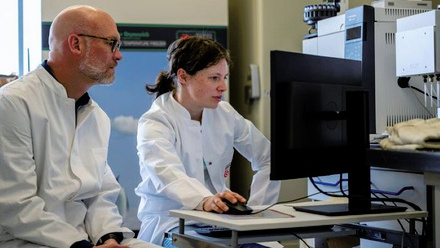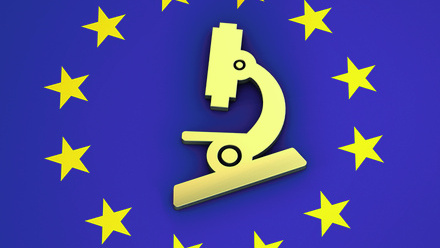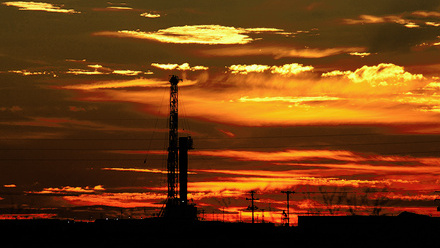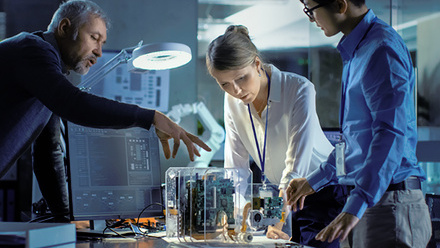An exploration of cultural change in mining
Shardell Joseph explores the renewed focus on culture and values in the mining sector, which challenges traditional perceptions or misconceptions of the industry as it seeks to attract the future workforce.
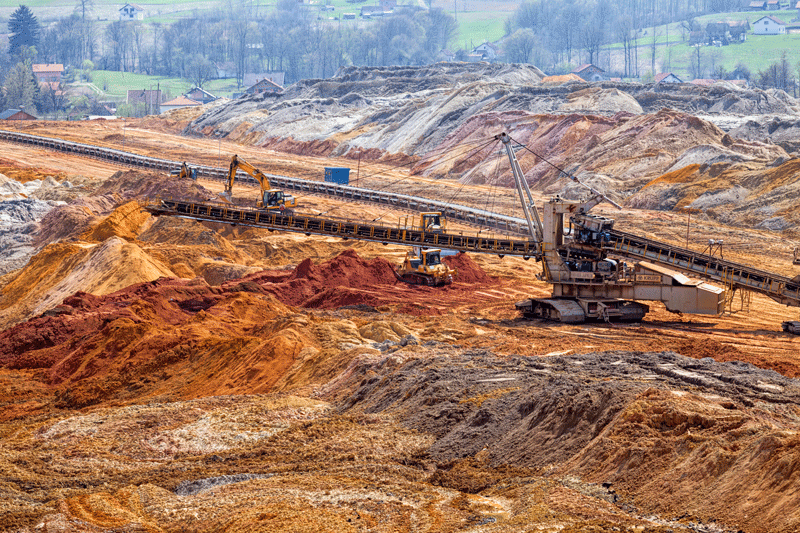
‘From my school days, I've always felt it's better to work within the system than outside it – for example, become a prefect and try to change the school. Now I'm in the mining industry, and if you want something changed, you can either fight against it, or you can get in the middle and try and influence it from the inside. That's my approach,’ divulges Fiona Cessford FIMMM, Corporate Consultant for Environmental, Social and Governance (ESG) at global mining consultancy SRK, with over 20 years’ experience in the sector.
She muses, ‘Historically, mining was seen as a positive career choice. My father moved from the north of England to South Africa to get a job in mining, and I think it was seen positively, as a very strong career. This has changed – with an understandable focus on the green economy, tailings dam failures, blowing up cultural heritage sites and loss of human rights associated with conflict minerals – the reputation of the industry has decreased. This is particularly relevant in my field of ESG where people may feel there's a moral conflict.’
But now, ‘responsible finance and responsible sourcing are major drivers for the industry, meaning that investors, the supply chain and the general public can put pressure on companies to improve ESG performance – this boils down to you and me and our purchasing power’.
She predicts that ESG will evolve and become more embedded into the corporate structure of mining companies.
‘I think that the change we're seeing now is that youngsters are coming out of education with sustainability in their DNA. At the moment, boardrooms have to have an ESG professional to advise them. In 10 years, you're not going to need that because every board member will understand the fundamentals of ESG – that's my aspiration.’
Alex Buck, Managing Director of Women in Mining UK, agrees, ‘The mining industry has always been very aware of the need for a social licence to operate, even if it hasn’t always gotten that right. This, combined with pressure from both investors and civil society, are ensuring that ESG is at the forefront of all corporate agendas.
‘We must play our role in the transition to a low-carbon economy and do it proactively rather than being compelled through regulation and legislation. We need the industry to be operating as safely and responsibly as it can for the benefit of all its stakeholders, beyond investors. This will result in a win-win for everyone.’
She reflects further, ‘One particular area that the industry does seem to be suffering from currently is a lack of appeal among the younger generations, based on the numbers of students applying for mining-related courses. This is a concerning trend as metals and mining are critical to our modern way of life and we must ensure we continue to recruit new talent with fresh ideas. While we may require new skills from other sectors, such as technology, we will continue to need technical professionals (including geologists, mining engineers, etc.).’
Jake Cain MIMMM, Business Developer at South African precious metals mining company Sibanye Stillwater, Former Geologist and Executive Committee member for Young Mining Professionals (YMP), notes that getting ESG right and attracting new and diverse talent to the sector go hand in hand.
‘As a sector, we are transitioning to a high dependency on technology to drive our sustainable, ESG-driven goals. As a result, there is more requirement than ever for environmental specialists, IT specialists, software engineers and programmers, data scientists and critical thinkers who can continue to innovate in a hugely dynamic sector. The mining sector, however, is competing with other sectors for skilled and qualified professionals, and perhaps now, more than ever, there is an increased awareness and focus on sustainability and having a positive impact on society.
‘Mining companies will need to ensure that their corporate responsibilities meet the expectations of the younger generations in order to attract and compete with other industries. Companies could perhaps market and better promote themselves as responsible corporate citizens and educate younger generations in what the industry is doing to support sustainability, the environment and corporate social responsibilities.’
Barbara Dischinger, Founder of International Women in Mining (IWiM), adds, ‘Mining is facing many challenges today – from digital disruption to sustainability and decarbonisation, while also learning to incorporate equity, diversity and inclusion (EDI).’
She reflects, ‘Leading mining industry organisations now promote the role of women both in terms of industry performance – attracting and retaining talent remains a challenge for mining – and in achieving global societal objectives in line with the UN's Sustainable Development Goals (SDGs). Improvements made to shift design, fly-in-fly-out, mental health, camps, introducing female personal protective equipment, etc. provide better work conditions and are important to make workplaces more inclusive.
‘Despite this progress, it remains vital that the voice of women be heard individually and collectively to continue to improve diversity, governance and sustainability in the mining industry.’
Broadening the talent pool
Dischinger ponders, ‘Women make up half the population. Intersectionality (the interconnected nature of social categorisations such as race, class and gender, etc.) is important to harness skills, knowledge and contributions from every member of society.
‘Diversity promotes diversity of thought, which is extremely important for creativity and strategic resilience which mining companies will need in order to tackle the next mining super cycle and the current challenges the industry faces.
‘You see more mining companies now having a staffed EDI role or team compared to five to 10 years ago. This signifies an important shift.’
Sharing her own experiences, Cessford says, ‘When I first started my career, I would have said that I had no bias against me, with very few exceptions – there were one or two occasions where I went, 'that’s misogynistic'. But overall, I would have said 10 years ago that I progressed and I was given opportunities. I became a Director of SRK, and I was recognised for the quality of the work.
‘In hindsight, looking back, I can see where there were barriers. At the time, I didn't see them, and I laughed off all the inappropriate comments and the naked women on the walls, because it’s how you survived in a male-dominated industry back then.
‘I feel like we've made good progress with women. That isn't to say, there's still a long way to go. For people who are coming with other diversity [characteristics] associated with sexuality, race, etc…the industry is probably a decade behind. Like ESG, you make a big step and then it kind of creeps along, and then you make another big step.’
Cessford also acknowledges the role unconscious bias can play. ‘I don't think people realise that they're creating these glass ceilings. And it’s only when we scream loud enough that they can be overcome.
‘[This] represents the unconscious part of the unconscious bias. Choosing someone to promote that you think you can be a buddy with or things like that, it doesn't seem like a conscious thought process but ends up making it really hard for progression.’
As part of the YMP group, Cain is witnessing the ‘hugely successful strides in increasing the proportion of women and multi-cultural backgrounds into the sector. Certainly, the last decade has seen a huge change in the diversity of the industry which can only provide better opportunities and more sustainable growth and development for young professionals’.
Buck also recognises the steps the industry has taken compared to 20 years ago. ‘This needs to continue so that the industry is seen to be truly representative of the society it serves, and everyone feels welcome and that they belong.
‘There are still challenges the industry needs to tackle…A recent McKinsey & Company report on women in mining highlighted that while 40% of entry-level roles are filled by women, the retention rate is still too low. McKinsey gives plenty of reasons, including women feeling the work is no longer intellectually challenging, the perception that there are fewer advancement opportunities for women compared to their male colleagues, the experience of being sidelined (especially in technical roles), and the sense that opportunities for operational experience and mentorship are created proactively for men, while women are expected to have acquired frontline experience elsewhere in order to qualify for advanced technical and leadership roles.’
She continues, ‘A number of the larger global miners are actively addressing these issues, however, it is important that the sector as a whole puts more effort into retaining women so we have better gender representation throughout all levels of the industry.’
A helping hand
A strategy to decrease the equity gap is through mentoring schemes. Established in 2018, the International Women in Resources Programme (IWRMP) is an annual cross-company programme that empowers women in mining to advance in their careers, overcome professional hurdles and build the confidence they need to become industry leaders. To date, the programme has empowered 200 mentees and 56 scholars from over 30 countries.
The programme matches mining professionals from all professions, age and seniority with senior industry executives (male and female). They are matched on skills and experience as well as personality. Dischinger shares ‘IWRMP places a strong emphasis on diversity and inclusion, aiming to reduce cross-cultural barriers by creating partnerships between talented, driven mentees and senior industry leaders committed to the promotion of women in mining. Mentees benefit greatly from the guidance and insight of the inspirational men and women mentoring them, who, in turn, expand their understanding of younger professionals’ perspectives and challenges. These individual benefits extend to positively impact participants’ teams and organisations, improving the position and opportunities of women across the mining sector.’
Women in Mining UK, meanwhile, offers a suite of programmes and initiatives from university all the way to Board level. These includes a scholarship programme with both the Camborne School of Mines and Imperial College London, UK, a paid summer internship scheme to gain valuable job experience, partnership with Women on Boards UK, and numerous networking, educational and mentoring events.
While YMP has chapters in major mining centres across the world to advance the global profile and leadership of the mining and exploration industry. YMP assists participants in obtaining the skills, support and knowledge to successfully advance their careers, develop a network of contacts within the industry, and identify career and mining-related investment opportunities.
Positives from the pandemic?
The mining sector, like many, has also established a new way of working through the pandemic, which could help broaden its appeal, Dischinger considers.
‘It has made flexible work a reality and it has improved attention to mental health. Mining had to learn to decide which roles are critical and need to be onsite and that a lot can be done remotely. This is quite a significant change and hopefully will help attract and retain talent to the industry.’
Ultimately, with the growth of the sector underpinned by the energy transition, there’s scope for challenging age-old perceptions of the sector to recruit the next generation. Cain says, ‘I believe there will be a continued drive within the sector to create greater diversity and inclusion within companies and professional organisations. But I also see greater value placed on ESG, sustainability and, in particular, the environmental impact of the industry. The greater diversity and ESG-driven initiatives will only create more opportunities for multi-disciplinary roles, which can only be a good thing for the development of the sector and the variety of career paths available.’
Keeping it in the family
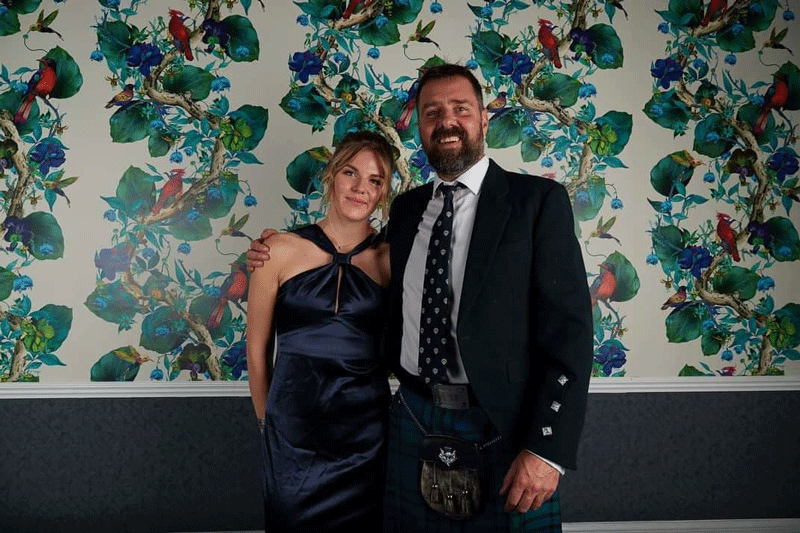
IOM3 student member Hannah Matheson is following her father Alexander Bruce Lister Matheson FIMMM into the mining industry. Here, they share their experiences.
Tell us about your experience in the industry so far.
Bruce: I am 51 years old and I work across industry (mines to civil engineering projects) – suffice to say I have worked regionally and on different projects in different roles, and lived in different cultures and societies around the world, on mine sites as well as civil engineering projects, so I have a pretty broad view of what’s changed over the last almost 30 years.
I am pleased my daughter has chosen mining as a profession. At a recent Camborne School of Mines Association dinner, I chatted with many students and recent graduates and was impressed with their awareness of the issues facing the industry – they are entering the industry at an interesting time.
Hannah: I am 21 years old and I’ve only just graduated…I finished my Mining Engineering degree at Camborne School of Mines recently (where my father studied) and signed a contract shortly thereafter for a mining engineering graduate programme with an Australian contractor based in Perth. I knew it was going to take a while until I could get over to Australia (visas, COVID, etc.), so I applied for a summer internship with the World Gold Council in London, UK. They took me on as a specialist intern working on climate change issues in the gold mining industry. I’m now working with the ESG team and will be staying on with them until the end of the year when I can get out to Australia.
What has been your impression of the culture/values of the industry?
Bruce: There has been over my time an increasing awareness of the value of diversity and the importance of local participation in projects – ever since before the Equator principles were a thing, this shift has been gradual but steady.
Hannah: As a young woman it was quite daunting to begin with, but people have been supportive, and I get the impression everyone is striving to make it a more diverse and welcoming industry. I’ve also noticed an awareness of the value of sustainability issues in the industry and more companies pledging to take practical steps to carry out decarbonisation.
What is the value of attracting more people from non-traditional backgrounds?
Bruce: Local participation in projects is key and the benefits are well reported on having a diverse workforce, from different perspectives...increased creativity...out-of-the-box decision-making, higher employee engagement, reduced employee turnover and, of course, community buy-in as well.
What do you consider to be the main environmental and social issues in the industry?
Bruce: Social/community involvement (licence to operate), environmental stewardship, decarbonisation and legacy building. Ethics is also an issue/topic as it contains all the environmental concerns, as well as issues such as corruption – combating corruption is as large an issue as any in the industry.
Hannah: Artisanal mining – more should be done to explore the advantages of formalising these operations to ensure a better standard of health and safety as well as reducing the harmful effects it may have on environment and the communities in which it operates.
To what extent does the mining industry appeal to early-career professionals?
Hannah: I think mining appeals to young professionals because of the opportunity to explore new places and the job could bring you all over the world if that’s what you want. Obviously, another key point for many young people in the current economic climate is the possibility to have a decent, intellectually stimulating job that pays well, and mining will always be necessary so it’s a bit of a safe bet.
Bruce: It seems the mining industry/companies' appeal is limited to people who are in the know – there seems to be no mainstream crossover, which is a shame – this is a global phenomena. The need for mining engineers is larger than it ever has been before, especially to help provide the required resources for the future – but even while this is huge, the appeal is limited due to misconceptions in the public sphere – mining as a career path has little mainstream appeal.
Outreach to schools and universities and an active policy of education through industry organisations such as IOM3, the Aluminium Stewardship Initiative and the World Gold Council is important. It’s our job as industry professionals to explain to the public just how things work, such as videos like the brilliant A World Without Metals available online.
How do you see the culture/values changing within the next decade?
Bruce: More of the same with a special focus on an increased awareness of the importance of the social aspects of what we do, not just onsite but in our own homes, and more legislation to speed things up.
Hannah: An increase in addressing the pressing need to combat climate change and ensure environmental stewardship is taken seriously as the consequences are unavoidable. Additionally, given the new generation of stakeholders that is concerned with these issues, it’s no longer just about the dividend.


